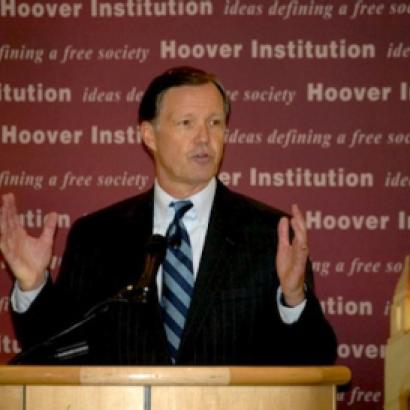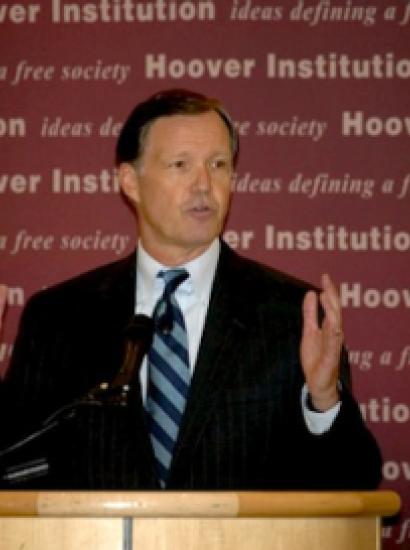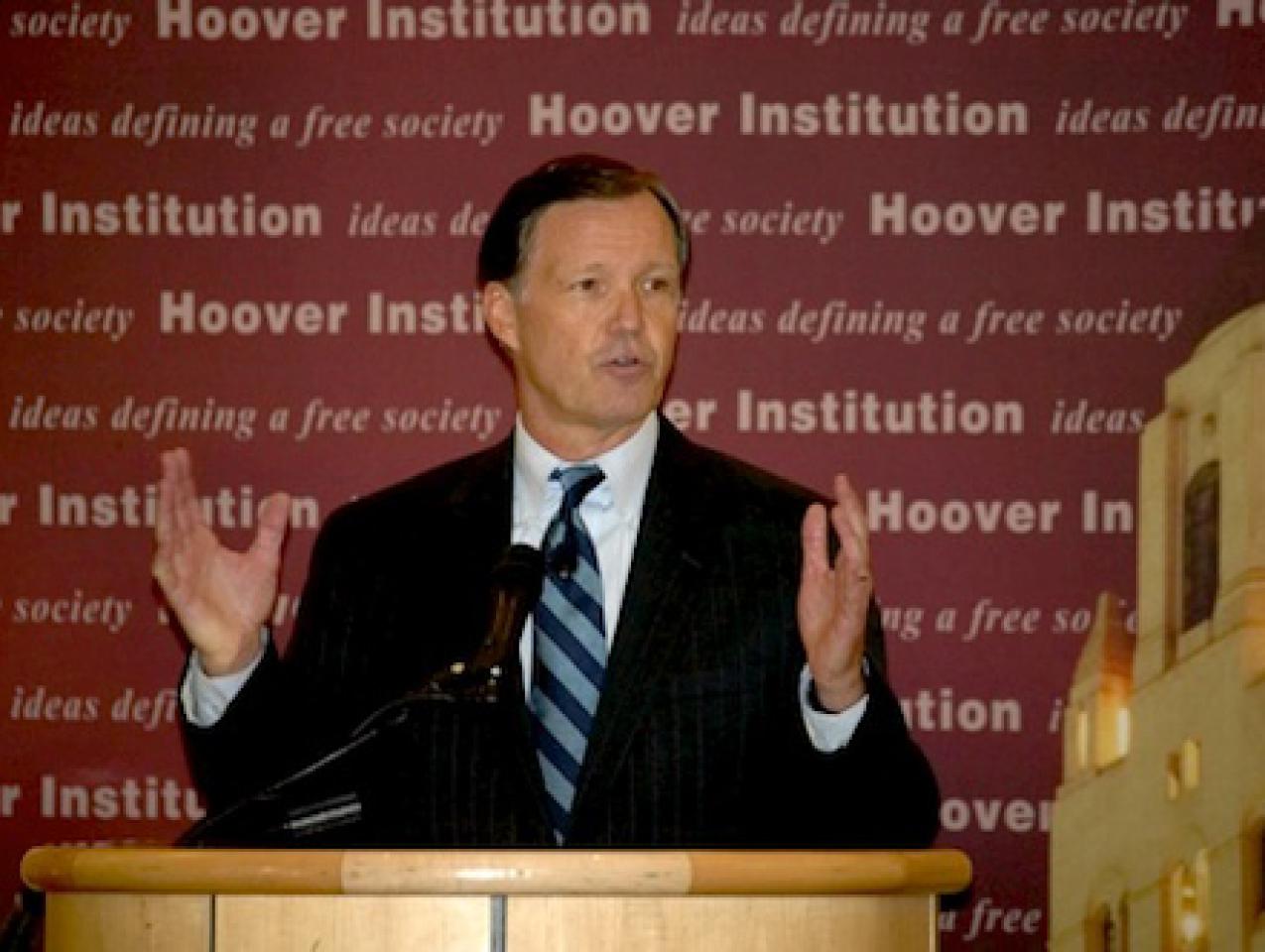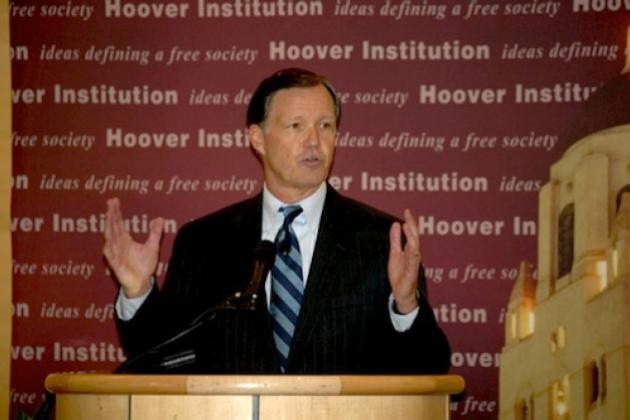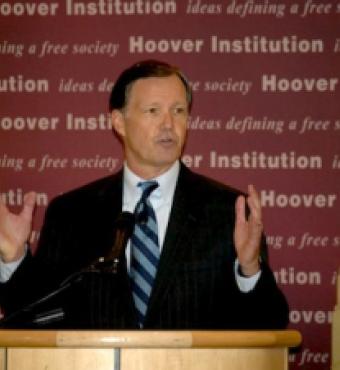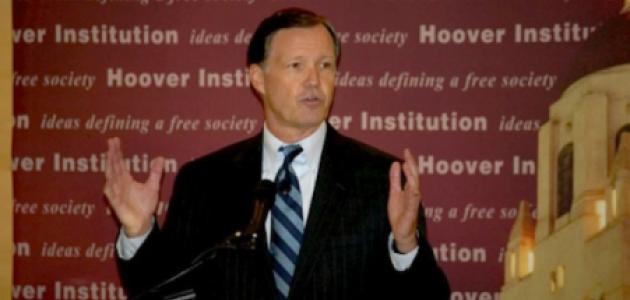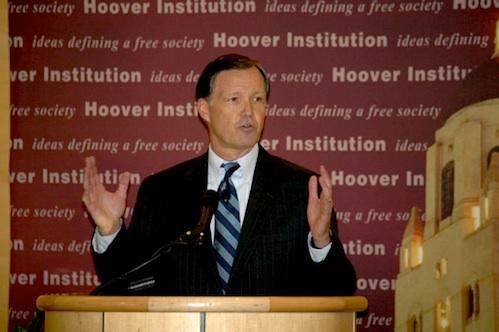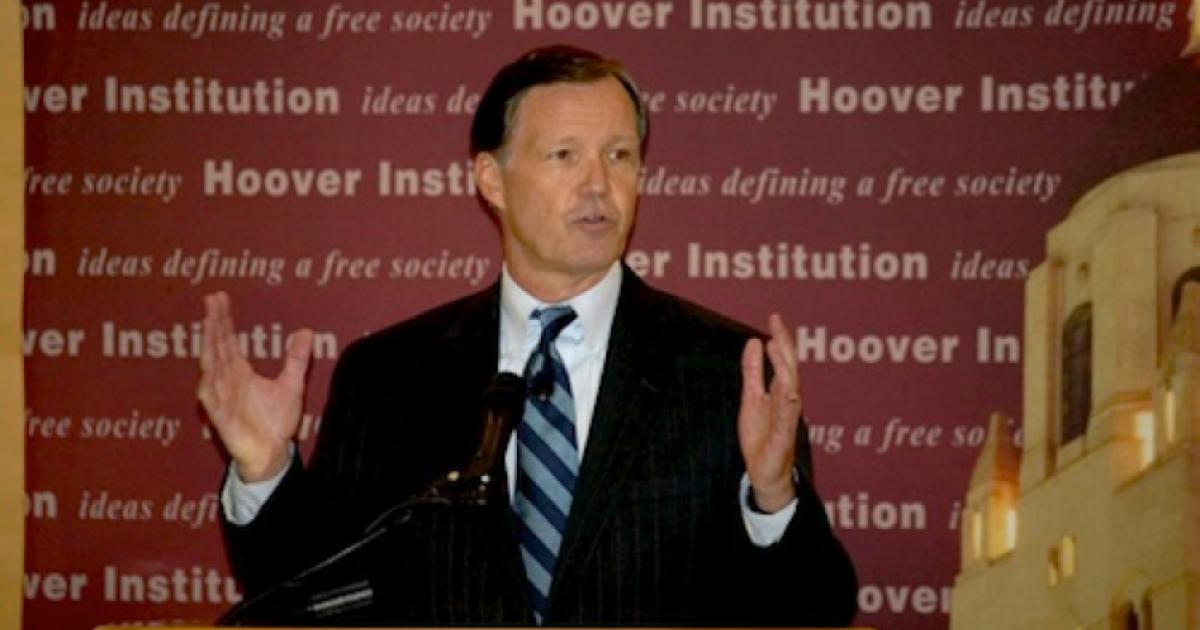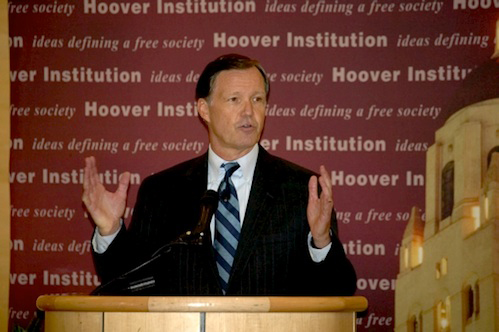
The 41st Hoover retreat, held October 18–20, featured presentations by leading experts on topics that are dominating the headlines. Many sessions focused on the economy, in particular, the causes of and solutions to the Financial Crisis. Also discussed were the costs of Health Care Reform, the changing direction of U.S. Foreign Policy, economic and religious practices throughout U.S. History, the Hoover Library and Archives, and the U.S. Military. In addition, how solutions to those problems can be arrived at through Social Sciences Research was offered by a coauthor of Freakonomics.
Hoover Institution
John Raisian, the Tad and Dianne Taube Director at the Hoover Institution, spoke about the research and other activities under way at the Hoover Institution in his opening remarks at the retreat, including the publication of Defining Ideas, a quarterly magazine that highlights the work of Hoover task forces and working groups. Those task forces and working groups, which began with the Koret Task Force on K–12 Education, will eventually number ten, said Raisian. Those new task forces and working groups include National Security and the Rule of Law; Virtues of a Free Society; Energy Policy; National and Global Economic Markets; Property Rights, Freedom, and Prosperity; Islamism and the International Order; Critical Junctures in American Government and Politics; Role of History in Policy Formation; and Health Care Policy.
Since the advent of the crisis in September 2008, Hoover has conducted substantial research into the causes of the financial crisis and how to resolve it. For the retreat, Hoover brought together scholars and government representatives, including Christopher Cox, Neel Kashkari, Russell Roberts, Thomas Sowell, Michael Boskin, Edward Lazear, to discuss their views on this ongoing concern.
Christopher Cox, former chairman of the U.S. Securities and Exchange and a 17-year-member of the U.S. House of Representatives, spoke on the financial crisis and how the U.S. government has expanded to deal with it. “Government doesn’t go away on its own,” said Cox. In before-dinner remarks on October 18 titled “Taming the Budget Beast in a Post-Bailout World,” Cox called for a framework for exiting the role the government has assumed in managing the financial crisis. Cox identified many programs that have been created, including TARP, and activities, such as the government overseeing Fannie Mae and Freddie Mac, that need to be eliminated.
“Government intervention was not the first choice, but it was necessary,” said Neel Kashkari in his presentation titled “A Review of the Causes of the Financial Crisis and Key Lessons for Reforming Our Regulatory System.” Having served from 2006 to 2009 in various capacities within the U.S. Treasury, Kashkari was able to give a firsthand perspective on the government response to the financial crisis. The financial crisis, he said, was rooted in housing, with a number of complicating factors, leading to problems with credit. Kashkari cautioned against reforms that could impede the country’s recovery and recommended continued research into understanding the causes.
In “Heads They Win, Tails We Lose: Causes and Consequences of the Financial Crisis,” Hoover research fellow Russell Roberts discussed what he concluded was rational behavior behind the risky investing that led to the crisis. Roberts said that much of that investing was done with other people’s money, ultimately with the backing of the U.S. government. “They thought they would get their money back if it all went bust,” said Roberts, which has proven correct. Wall Street, along with Americans, must take risks. He also recommended against re-creating the securitization model, which some are trying to do, and against creating another Fannie Mae, which he called a dysfunctional institution. He also criticized the ad hoc intervention of government and the idea that some institutions are too big to fail.
Thomas Sowell, the Rose and Milton Friedman Senior Fellow on Public Policy at the Hoover Institution; Michael Boskin, Hoover senior fellow; and Edward Lazear, the Morris Arnold Cox Senior Fellow at the Hoover Institution participated in a presentation titled “A Tribute to Rose and Milton Friedman: Thoughts on What They Would Have Done in Today’s Economic Circumstances.” In Thomas Sowell’s introductory remarks he cited government intervention in housing and housing loans as causing the financial crisis. Moderated by John Raisian, the panel examined causes, including government intervention in housing and loose monetary policy, and solutions to the crisis, such as monetary policy and fiscal policy stimulus and financial regulation.
The future of health care reform was the topic of a presentation by Hoover senior fellows John Cogan and Daniel Kessler. Cogan, the Leonard and Shirley Ely Senior fellow at the Hoover Institution, said that the problem must be accurately defined to address it effectively. In the debate today about health care, the problem is “high and rising health care costs,” which, he said, cannot be sustained.
Kessler outlined alternatives to proposed taxation to pay for health care, including reforming the tax treatment of health insurance, reforming insurance regulation, and experimenting with ways to deliver a basic package of health services, other than conventional insurance, to people with limited incomes.
Hoover senior fellow Victor Davis Hanson discussed the changing U.S. approach to dealing with the world under the Obama administration in “Our Brave New Foreign Policy.” Hanson questioned the success of the new approach, which has achieved few if any benefits for the United States.
Michael McConnell, Hoover senior fellow, in his presentation, “Free Enterprise and Free Exercise,” discussed how the current economic and religious views in the United States have developed. Early in the country’s development the dominant view was mercantilism–that government should intervene in a country’s economic development–which also influenced the development of religious practices. Through scholarship by Adam Smith and leadership by Alexander Hamilton, however, this worldview was overturned and replaced with capitalism. In turn, separation of church and state was advocated by religious leaders of evangelical sects to strengthen the practice of religion, which would likely be undermined by government intervention, said McConnell.
In his presentation “Nines are Wild,” Richard Sousa, director of the Hoover Institution Library and Archives, discussed the collections housed at Hoover, which, since their founding in 1919, have continued to grow. Sousa highlighted additions to the collections from each year ending in the number nine, including diaries kept by Chiang Kai-Shek, an audiotape of the famed Kitchen Debates between President Richard Nixon and Soviet premier Nikita Khrushchev, and videotape of the Tiananmen Square uprising.
Greg Jaffe, a Pentagon correspondent at the Washington Post and coauthor of The Fourth Star: Four Generals and the Epic Struggle for the Future of the United States Army, gave before-dinner remarks on October 19. Jaffe said the generals featured in the book, including Hoover visiting fellow John Abizaid, were chosen to reflect changes in the U.S. Army and how it is fighting the war in Iraq.
“Simple and cheap solutions,” said Stephen Dubner, coauthor of Freakonomics and the forthcoming Superfreakonomics, are a large part of the success in dealing with seemingly insurmountable problems. In his presentation, “Superfreakonomics: Global Cooling, Patriotic Prostitutes, and Why Suicide Bombers Should Buy Life Insurance,” Dubner outlined numerous examples from his book by that contradict common beliefs. For example, among doctors, the practice of washing their hands is low, resulting in the spread of bacteria, counterproductive in treating patients. After numerous, often expensive, efforts by one hospital to change the doctors’ behavior, it posted an image showing the bacteria on an unwashed hand, a simple and cheap solution that increased the doctor’s hand-washing rates.
In addition to the speakers mentioned above, breakout sessions featured the following Hoover fellows and guest speakers: Michael Boskin, Hoover senior fellow, and John Cogan, the Leonard and Shirley Ely Senior Fellow, on “How California Can Get Its Groove Back: An Update on the California Tax Reform Commission”; George Shultz, former U.S. secretary of state and the Thomas W. and Susan B. Ford Distinguished Fellow at the Hoover Institution, on “Significant Progress toward a World Free of Nuclear Weapons”; Shelby Steele, the Robert J. and Marion E. Oster Senior Fellow at the Hoover Institution, on “Why Jimmy Carter and Barack Obama Don’t Really Like America”; Scott Atlas, Hoover senior fellow, on “Health Care Reform: Options and Consequences”; Thomas Henriksen, Hoover senior fellow, on “The New American Way of War in Afghanistan”; Norman Naimark, Hoover senior fellow, on “Stalin in the Hoover Archives”; Morris Fiorina, Hoover senior fellow, on “The 2008 Elections and the Status of the Republican Party”; and Edwin Meese, distinguished visiting fellow, on “What’s Happening at the Supreme Court.”







